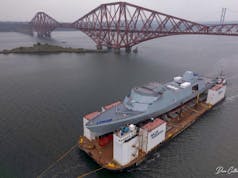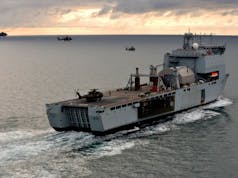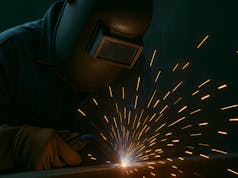Many news organisations have reported that there could be up to 800 redundancies from Clyde shipyards, this doesnt seem to be accurate.
According to reports, union representatives were told by BAE Systems that a “worst-case scenario” of 800 redundancies was possible if the UK government pulled back from its commitment to the manufacture of eight Type-26 frigates on the Clyde. This type of tactic is common in the negotiation of contracts, especially on this kind of scale.
A MoD spokesperson said:
“The Government is committed to building ships on the Clyde and to the Type 26 programme. Over the next decade, we will spend around £8 billion on Royal Navy warships. As set out in the Strategic Defence and Security Review, we will build two new Offshore Patrol Vessels on the Clyde, maintaining Scottish shipbuilding capability ahead of the start of the Type 26 build. We will also consult with Industry and Trade Unions as part of the National Shipbuilding Strategy, which will set the UK shipbuilding industry on a sustainable footing for the future.
Ahead of the announcement, the SNP and others had said that any reduction in the number of Type 26 frigates being built on the Clyde would be a “betrayal” of the workforce, with some MP’s even going so far as to claim “promises were broken”. A significant amount of MP’s from the Conservative party also posted strange and now deleted tweets regarding the number of frigates to be ordered.
The original plan for the class had been 8 anti-submarine warfare variants and five general purpose variants, this remains largely unchanged except for the specification of the later five vessels, which has been reduced to make them more affordable.
Then Prime Minister David Cameron told the House of Commons:
“There will be eight of the Type 26s and at least another five of the new type of frigate, probably more, and they can be built in Scotland if the conditions are right. The only way these ships wouldn’t be built in Scotland is if Scotland was independent and didn’t have the national resources of the Royal Navy.”
Mr Cameron also told the Commons that the new class of frigates, now referred to as the Type 31, would be “more affordable than the Type 26 which will ” allow us to buy more of them for the Royal Navy so that by the 2030s we can further increase the total number of Royal Navy frigates and destroyers.”
The Type 26 frigate represents the future backbone of the Royal Navy and a massive leap forward in terms of flexibility of surface vessels enjoyed by the service. It and the new Type 31 will replace the 13 Type 23 frigates of the Royal Navy and export orders are being sought after by BAE. The programme has been underway since 1998, initially under the name “Future Surface Combatant”. The programme was brought forward in the 2008 budget at the expense of Type 45 destroyers 7 and 8.
The Type 26 and Type 31 frigates, regardless of variant, will be adaptable and flexible frigates with a wide array of cutting edge sensors and weapons designed to help them effectively and efficiently meet evolving mission requirements. What’s more, they will all be built in Glasgow.













The save the royal navy has an article, suggesting that the type 31s may be built simultaneously utilising appledore, a and p, and birkenhead. Will this impinge in the work agreement with bae? I personally like the thought in future of appledore for example to get opv, mine replacement work etc. To add competition.
I followed them. They put a terrible spin on everything. Awful media.
yeah “save the royal navy” – as if the RN is going anywhere…
We need to stop pondering to the scots. The ships should be built wherever in the UK, that brings the best value for the tax payer (who are mostly in England). If that is Clyde then great, if it is not then so be it.
Its also a big irritant that Sturgeon who constantly pushes for independence from the the rest of the UK has the balls to tell the UK government to confirm Scottish jobs for ship contracts which she was all to happy to give up if Scotland became independant.
We must be getting to the stage where there just has to be parallel building across multiple yards aren’t we? With the T26 getting pushed back and back that will become a race against time to get them commissioned before the T23s are too old. Then T31 has to be designed before build can start so that also becomes a race against time with expiring T23s. Throw mine replacement into the mix, not to mention Argus, Dilligence (both towards end of life) and the 3 new solid support ships (which surely will be forced offshore due to capacity and/or budget constraints? Not a bad thing in my view given how much we seem to be getting for our money with the Tide class tankers and how quickly).
I quite agree. Gone are the days where the UK can build an entire class in one yard. Modular design is fantastic and allows final assembly to be quick (look at how quick QE and POW are coming together). With regards to RFAs there is no point even trying to build them in the UK. We don’t have the economies of scales that the likes of South Korea have. Besides I’d rather our ships were built over seas to save money than have them built in the UK and end up with less ships. *cough T45 cough ;)* FFTs are coming along well and are likely to be a good value for money tanker. However I can see why our capital ships are still built in the UK, but do the Type 31s need to be built in the UK? No, not really. (well unless BAE win the contract).
The navy somehow managed to get the tide classes built overseas without causing an absolute outrage. They should use whatever tactics they used that time to get the Argus/Dilligence/etc built overseas for a fraction of the cost of building them here.
Tides being RFA ships rather than RN probably made a huge amount of difference but the solid supply ships (SSS) and Argus/Dilligence replacements will also be RFA so there is probably significantly more hope of getting more value via an overseas build for those than there is for any of the frigates.
There is nothing wrong with building these ships in Scotland and the Idea of a frigate factory is a good one. The problem here is a lack of commitment from the government to get into some sort of fleet management.
It is really simple asset management that the MOD is frankly rubbish at. We need to stop major refits and life extension programmes in preference to proper fleet management.
13 ships are just not enough – it needs to be around 35 -50 of these and we should replace all other Patrol, Mine and escorts with a more flexible set of combat vessels.
Yet another cock up in the making
There is certainly nothing wrong with building the ships in scotland, but we shouldn’t be doing it just to buy votes, we should be doing it because it produces the best value for the tax payer and the navy.
I am not entirely sure why we need to build them in the UK at all. The idea that during a total war situation we could start mass producing ships, is already a joke, we don’t have enough ship yards or the skills to do it anymore. If it was possible to build them abroad for sufficient saving that would justify the money leaving the country, then i don’t see the problem. Ok this would mean mass job losses, which is bad, but i don’t see the government trying to prop up other industries like this. Hopefully this wouldn’t be a problem, because to out weight the money leaving the country, they would need to undercut the uk big by at least 50% and if they can do that, then we have a big problem with inefficiency.
Defence spending underpins not only local economies and supply chains but the research and development and training that comes with supporting such activities: and this feeds in to the wider society.
Reducing everything to mere costs will eventually leave the country without the industrial and technological abilities to do anything and a particularly homogenous and mono-dimensional society. Eventually we’d become like a banana republic centred on finance rather than fruit.
Moreover entire communities wold become economically unviable and would witness a brain drain such as that the former mining towns have suffered. These places are unable to attract investment, the youth that can; up and leave, those who can’t remain. These regions become economic sink holes, the towns bereft of culture and intellectual diversity and economically unproductive. Breaking this status quo has evaded both Labour, the Conservatives and the Coalition over the last 30 yrs. Its better to avoid it in the first place.
You then suffer over-heating in the growth regions; pressure on services and degraded quality of life for all.
A pure, high level cost benefit analysis will tell us to do exactly as you say but we can see from the evidence of history what reducing intellectual, commercial and industrial diversity does to society and the economy.
What a very strange attitude!!! I wonder what job you do? I’m sure if you look far enough afield there is someone in the world who will do your job for 50% and bingo you are out of a job too! It’s called a race to the bottom and carry on down that road and we will all (apart from the seriously rich of course) be poorer for it.
I find it interesting that some previous commenters appear to have zero loyalty to the UK shipbuilding industry.
Why not just outsource all shipbuilding to the lowest-cost bidder? Erm… because these ships might end up being our last line of defence one day. I’d much prefer the ships to be 100% home built, using British steel (no laughing at the back). If you’re facing an enemy, how confident would you be knowing that your vessel was built by the lowest bidder? A bidder who would invariably cut as many corners as they could possibly get away with, to save money. A builder who has no loyalty to this country, only to profit (or perhaps their own national self-interest).
Is people’s commitment to neoliberal ‘market forces’ really so pervasive as to potentially trump national security? If so, why stop at outsourced ships? Why not simply hire private armies to fight our wars, using foreign made weaponry? It would be cheaper, and apparently that’s all that matters.
As for the Scottish element – the ships were planned to be built in Scotland. I presume because that’s the MoD figured that was the best place to build them. However, when pressed for firm commitment post-referendum, the government has went into weasel mode. You have to forgive the Scots for not trusting the Tories, the distrust is based on empirical evidence after all. When your country’s (or region’s) proud industrial heritage was obliterated – by both major parties – you quite rightly learn to trust no one. And – contrary to this article’s bold assertion, there are no guarantees with regard to the frigates. Let’s revisit this article in a year or two and see how things have progressed…
I don’t believe we will build more ships than the planned 13, we always get that old rubbish about cheaper ships mean more. We have had that since labour first got in government and it went the other way
Have we? Up until now they have always wanted better ships but less of them. I certainly can’t remember any time in the late few decades when the plan was for more ships not less.
The T45 was supposed to be more but ended up half and all that rubbish about that it was so we could build the new frigates is rubbish and I don’t believe it whatever anyone says